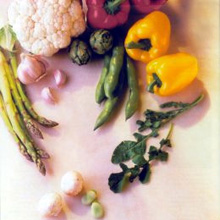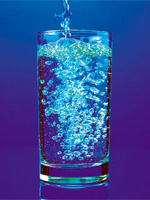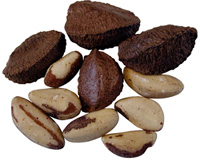Originally published in August 2002 icon

’Best Practice’ Diets For the Cancer Patient
Here we look at diets including diets for patients on chemotherapy, overviews of Gerson Therapy, Plaskett and Plant diets, plus a number of ’titbits’ from Cancer Watch on diet over the last three years. There is also a new section from our ’Food Doctor’.
You will also find extensive coverage of vitamins, minerals and other helpful supplements and foods under ’nutritionals’, and alternative diet therapies such as ’Metabolic Therapy’ or ’Vitamin C Megadoses’ or the use of ’Pancreatic Enzymes’ (also see ’Attack Of The Enzymes’).
Treating Illness - The Big Picture
In your everyday diet, the relationship between how much protein, animal 1 and carbohydrate you eat, or the am of natural vitamins, co-enzymes and other supporting factors or the traces of minerals you consume will all affect your cellular metabolism. And cancer is a disease of the cellular metabolism.
If you are a gardener and your plants or vegetables don’t grow fully or were sick, you would start by questioning whether the soil was rich enough with nutriments and whether they have enough water. So why don’t we adopt the same process for a newly diagnosed patient?
Because patients demand that doctors do something, and quickly. And they do it. For example, they provide anti-inflammatories, antibiotics and anti-histamines all designed to cover up the symptoms and get you back on your feet as fast as possible. This approach is termed Allopathy.

But what of the underlying illness, the original cause that made the cancer appear in the first place?

With cancer a surgeon can cut out the lump, whilst drugs and radiotherapy can kill off the rogue cells. But what of the underlying illness, the original cause that made the cancer appear in the first place? Simply tearing a leaf off a diseased plant will not allow the plant to recover even if that leaf shows the most symptoms!
Whilst surgeons, oncologist and cancer specialists are to be praised for their excellent work, if the re-occurrence of the problem is to be avoided, their efforts have to be seen in the context of a bigger picture. For lasting health you have to treat the body, the whole body and not just the lump in the breast.
Naturopathy
At the basis of many complementary treatments is the Science of Naturopathy. This holds that there is only one health, and so there is only one disease. This may be expressed in different forms but all forms of illness fundamentally arise from the same lack of health.
Naturopathy holds that three ’factors’ are crucial to health:
1:
Nutrition
The first and most important. Nutrition is with eating and drinking. It is with nourishment and with providing the nutriments to make our body healthy. Salt and refined carbohydrate, for example, are anti-nutrients. Raw and fresh foods, clean water and air are our nourishment. Even Hippocrates said, "food should be our medicine and medicine our food".
In 1980 Professor Thomas McKeown concluded a major study across populations (Epidemology) and stated that the influence of nutrition far exceeded any other health measure. Since he also stated that the only medical practices needed were dentists, accident surgeons and the occasional obstetrician, his conclusions didn’t go down too well amongst doctors!
Professor Ray Kearney and Dr Gavin Greenock concluded that in times of ill health, fasting or calorie restriction increased the body’s anti-inflammatory response. Easy to ingest raw food juices help this process of self-healing.
2:
MovementCorrect skeletal support, posture and movement allow the body’s natural nervous energy to flow freely and this is vital for a body’s health. We will review this fully in future articles. This energy free-flow is the principle behind Acupuncture, Cranial Osteopathy and many more treatments widely used these days.
3:
Your Mental StateAgain we will review this in great detail in future editions. Suffice it to say that there is concrete evidence that when your brain is stressed the cells in your breast are stressed; when it’s depressed, the cells in your prostate are depressed.
As we know, populations in South East Asia, China and Japan have far lower rates of cancer than here in the West. But, as their diets change, so too do the cancer statistics. Affluent Japanese women have seen their rates of breast cancer rise by 500% in twenty years.

Affluent Japanese women have seen their rates of breast cancer rise by 500% in twenty
years

Myeloma, often indicative of a decrease in immune system strength through toxin increase, is up 300% overall. Take a Chinese woman to the West and she leaves behind her low cancer rates and instantly adopts ours.
Sir Richard Doll and Sir Richard Peto of Oxford University looked ’causes’ of cancer in a study funded by the Imperial Cancer Research Fund and the Medical Research Council. They concluded that, for example:
35% cancers were caused by diet
30% by smoking
10% by reproductive hormones
10% by infection
5% by alcohol
It seems pretty conclusive. We must look to our diets for health, and especially at times of illness.
Macrobiotic Diets
In Greek ’macro’ means great, and ’biotic’ means concerning life. Macrobiotics, or the greater view of life, is based on the ancient Chinese understanding of Yin and Yang in the Universe and is not confined to diet at all. The Chinese believe that everything in the universe can be divided into these two categories, (think mother or father aspect), although it is fluid and one form can change into the other.
Between 1896 and 1907 Sagen lshizuka, a Japanese army doctor developed a theory of nutrition. In it he combined both the Western medical thinking with ancient oriental thinking. His basic tenet was that the food we eat not only sustains life but underpins our health and happiness.

The food we eat not only sustains life but underpins our health and happiness

During this period of time Japan was being heavily Westernised and he argued strongly against it, recommending re-adoption of the traditional Japanese diet i.e. whole, unrefined foods with little or no milk or animal food. He set up a clinic and treated hundreds of patients with a traditional diet based on brown rice and a variety of land and sea vegetables. Such was his success that he became known as the ’Anti-Doctor’!
His 5 principles were:
1:
Foods are the foundation of health and happiness.
2:
Sodium and potassium are opposites in food and control its yin and yang character.
3:
Grain is properly the staple food of man
4:
Food should be unrefined, whole and natural
5:
Food should be grown locally and in season
Macrobiotic diets also require that foods are eaten as near the natural state as possible, and cooking is almost an art form.
The use of a macrobiotic diet requires that there is an understanding of the patient’s yin and yang state and that foods are then provided to correct any imbalance. The detail of their use for, say, the cancer patient is beyond the scope of this article. You should telephone your local centre, contact the Macrobiotic Association and/or go to the website for a better understanding of how a macrobiotic diet might fit your personal needs. A fundamental part of macrobiotics is that every one of us is different and one man’s grain is another man’s poison. So you must check it out thoroughly before you act on any advice. But the evidence is clear. A basic Japanese diet is much, much better for your health than a Western diet.
The Bristol Cancer Help Centre

Nutritional therapy encompasses all aspects of the most basic needs of life; water, food, light and air and a relaxed creative state of mind

Prince Charles is the Patron of this excellent complementary cancer centre, which offers cancer patients a holistic approach to their treatment alongside the treatments being used by medical science. One part of this is nutritional therapy, which encompasses all aspects of the most basic needs of life; water, food, light and air, and a relaxed creative state of mind.
The aim is to assist the body’s self-healing mechanisms to eliminate the disease. Their recommendation is to eat an essentially vegan diet with an accent on wholefoods and wholegrains. This is supported by certain vitamins in supplement form, and by emphasis on specific foods. The diet is extremely sensible aiming to cut fats, especially animal fats and the ’foreign’ hormones that meat and dairy provide, cut known toxins, and build the immune system and provide a number of cancer fighting natural agents.
The guidelines include:
Eating a wide variety of fresh vegetables and fruits, especially raw and organic.
Increasing the range of grains eaten to include brown rice, barley, millet and quinoa (all in ’whole’ form) Avoid bran and fibre.

Eat nuts and seeds (especially pumpkin, sunflower, poppy and sesame)
Increase the level of pulses in the diet.
Three times per week eat beans and lentils.
Drink at least 2 litres of filtered or bottled water per day
Make your own juices of fruit and vegetables. (organic)
Use cold pressed oils for cooking and salads. (e.g. olive and sunflower)
Avoid:
Red meat
Saturated fat i.e. dairy (substitute soya)

Smoked and salt cured foods
Processed and refined foods
Refined sugar (use honey if you must)
Preservatives
Caffeine
Sweet fizzy drinks
Excess alcohol
The guidelines also stress that no single diet is correct for everyone and diets are modified to the person and his/her lifestyle.
The evidence is clear.
The consistency of the Naturopathy, Macrobiotic and Bristol approaches is there for all to see.
Moreover the incidence of cancer in the West when compared with Chinese or Japanese statistics hardly leaves any room for debate.
These ’diets’, especially if you have cancer, must form a sensible part of your total integrated approach to your cancer.
Bristol has several good publications. Try ’Healing Foods’ by Jane Sen (telephone 0117 980 9500 to order).
The Bristol Cancer Centre Vitamin Guide
Accent is placed on:
Vitamin C - found in red peppers, papaya, pineapple, broccoli, green leafy vegetables, berries.
Beta-carotene - found in yellow and red peppers, carrots, apricots, watercress, spinach, sweet potato.
Vitamin E - found in nuts, soya, seeds, avocados, wheat germ, vegetable oils and eggs.
Vitamin B12 - found in soya, seaweed and fortified breakfast cereals.
Selenium - found in grains, tuna, brazil nuts, tomatoes and broccoli.
Zinc - found in oysters, lentils, pumpkin seeds, almonds, oats, eggs and wholemeal rice.
There is an illustrated wall chart available from CanHelpNow
BRISTOL CANCER HELP CARE Helpline: 0117 980 9500 Website: www.bristolcancerhelp.org.
BRITISH COLLEGE OF NATUROPATHY AND OSTEOPATHY Tel: 0207 435 6464